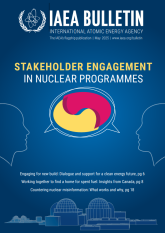When I took the helm of the IAEA in 2019, nuclear energy was not recognized in the world’s most important global conversations on energy and climate. Now, five years on, there is a global consensus on the need to accelerate deployment of nuclear power to address climate change and energy security goals.
This took time and effort. At the United Nations Climate Change Conference in Madrid (COP25), the first I attended shortly after becoming IAEA Director General, nuclear energy was still very much an outsider. But young people, politicians, scientists and others who believe in its ability to address pollution, climate change and energy security were making inroads through education, documentaries and social media.
When the energy crisis and the conflict in Europe hit, momentum for nuclear energy was already growing. In 2023 at COP28 in Dubai, for the first time the signatories of the UN Framework Convention on Climate Change included a call to accelerate deployment of nuclear power — along with other clean energy sources — in their Global Stocktake on the Paris Agreement. World leaders agreed with what science had been telling us for years: including nuclear is the only feasible way to achieve deep and rapid decarbonization. More than 20 countries called for tripling global nuclear capacity. Several other countries, companies, international banks and financial institutions later joined that pledge.
In 2024, world leaders built on this momentum at the first-ever Nuclear Energy Summit, affirming the important role of nuclear power. This reflects a fundamental change that would have been impossible without stakeholder engagement.
Countries often identify effective communication with stakeholders as a key challenge when initiating a nuclear power programme or related activities, such as uranium mining. Creating stakeholder awareness and understanding — whether from the nuclear industry, government, the media, local communities or non-governmental organizations — is essential to building mutual trust.
Particularly important stakeholders are those who decide whether to invest in nuclear. They include decision makers and influencers at government treasuries, international financial and development institutions, including the World Bank and regional development banks, as well as investment banks and insurance companies.
Designing and implementing programmes for productive stakeholder involvement starts with communicating energy policies and strengthening stakeholders’ understanding of nuclear power. It happens in board meetings of banks and insurance companies, and at public gatherings in cities, towns and villages across the world.
In May, the IAEA will gather many different stakeholders for the first International Conference on Stakeholder Engagement for Nuclear Power Programmes, including dozens of mayors of towns and cities hosting nuclear power plants or other significant nuclear installations, from reprocessing to waste sites. Who better to explain the impact of nuclear power than people from communities that host nuclear facilities! ?
Stakeholder engagement is essential to achieving anything of lasting value, including new power plants that will produce clean electricity, heat, cooling or hydrogen for a century, or repositories that will store spent fuel deep underground for a thousand centuries.
It needs time and patience. Despite recent progress, nuclear power is still struggling to get off the ground in many places. While some 60 reactors are under construction globally, most are in just a handful of countries.
Today, aspirations for nuclear power are higher than they have been in decades. Turning them into the big capacity increases necessary to meet climate and energy security goals requires steadfast commitment. A vital part of the answer is clear: we need to keep engaging our stakeholders.



